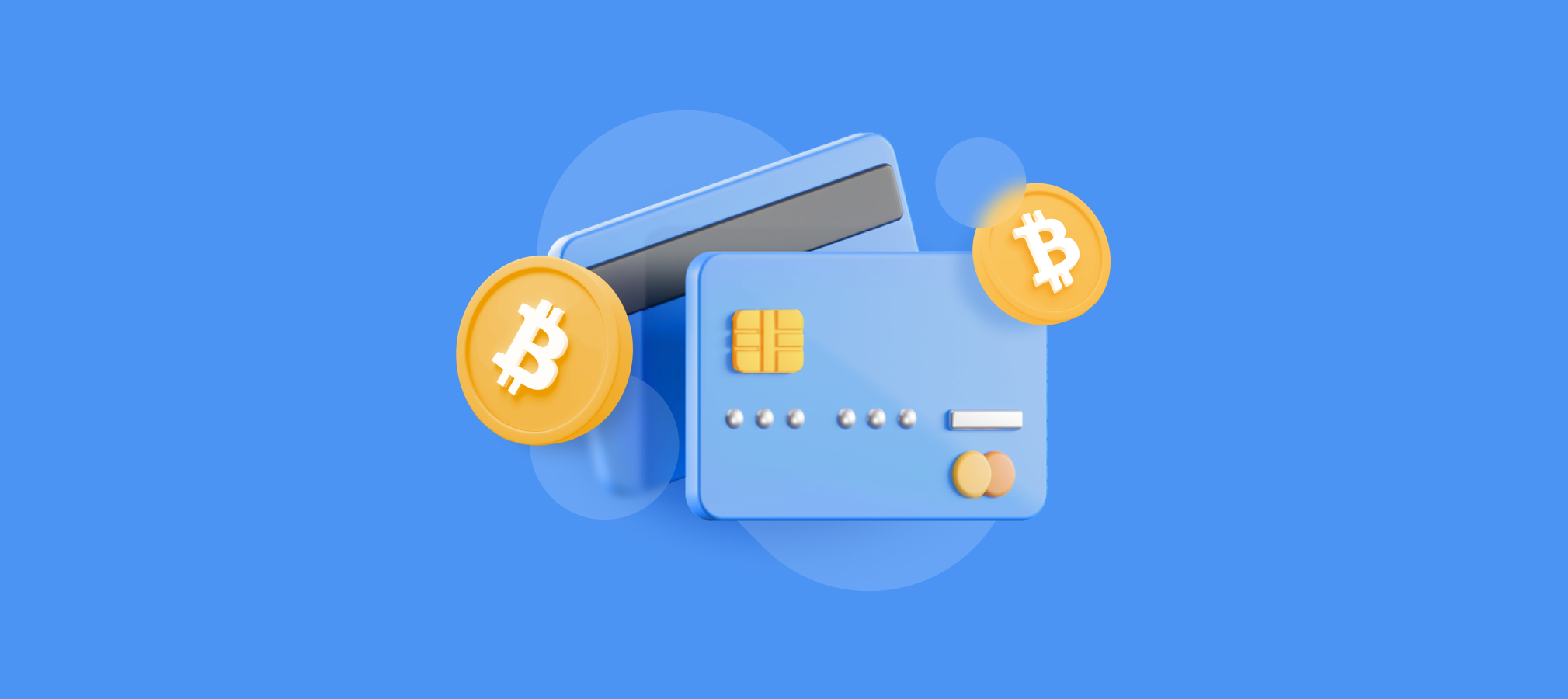Crypto Cards

This blog post will cover:
- Debit cards
- Credit cards
Cryptocurrency is getting more and more popular, the adoption is spreading fast and it requires special instruments. Crypto cards function pretty much like the debit cards issued by traditional banks. The companies that issue crypto cards work together with Visa and MasterCard payment systems. And no matter what card users want to get, they still need to go through the verification process, which includes sharing some personal information. However, crypto cards have a number of differences:
- First of all, they are funded with cryptocurrency, instead of fiat money. At the same time, since most merchants are unable to receive crypto payments, they receive fiat. Crypto cards help users to make a quick swap.
- Secondly, some of the cards allow holders to earn interest on their savings on the account and sometimes get rewards for using the card.
- Moreover, some crypto cards take fewer transaction fees than traditional ones.
- Probably, the most important advantage of these cards is low conversion fees. Cryptocurrency works as a bridge between all the currencies, which may help to save some money.
It is important to remember that crypto payments have some restrictions. For example, some crypto cards may be accepted only within a certain territory, such as EU or US, or by specific merchants. Nevertheless, they have the basic functionality: crypto cards holders can purchase goods and services, convert cryptocurrency to fiat, and withdraw savings via special ATMs.

Debit cards
Crypto debit cards are suitable for the everyday usage of cryptocurrency. They allow users to connect their bank accounts to their crypto accounts. Thus they support fast swaps between cryptocurrencies and fiat money. Let’s take a closer look at how they work.
First of all, a user should top up the accounts with any cryptocurrency. After that, the card is ready to be used. When a purchase is made, the card provider converts crypto into fiat and the goods or services provider receives the payment.
Crypto.com (Visa)
This card is very flexible. It supports around 90 cryptocurrencies. It is important to remember that the card uses Crypto.com (CRO) tokens, which are compatible with other cryptos. Nevertheless, this card has the widest range of cryptocurrencies.
There is no monthly limit for transactions and no ATM’s withdrawal fees if the sum does not exceed a withdrawal monthly limit. Moreover, there are a lot of bonuses, such as 100% cashback on Spotify or Netflix subscriptions for some types of cards.
Coinbase (Visa)
Coinbase Visa debit card uses Coinbase accounts. Customers are able to choose wallets they would like to use. The most important advantage is that this card is accepted everywhere around the world where Visa is accepted. Unfortunately, the amount of countries where the card can be issued is limited, but the team is working on expanding the offer to additional markets. However, so far it supports 8 cryptocurrencies only.
BlockCard (Visa)
BlockCard offers a variety of cards for different users’ needs. It requires no transactions, deposit, or exchange fees. Some types of cards also do not have withdrawal fees. Plus there is a daily spending limit of about $5,000. So far it supports 13 cryptocurrencies, including ETH. There is one significant drawback. BlockCard is accepted only in the United States.
Binance (Visa)
This card supports 30 cryptocurrencies. It does not charge any fees. It also offers up to 8% cashback on any purchase. Special attention here is paid to the safety and security of users’ funds. The major drawback is that this card can only be used in Europe, excluding the U.K.
Credit cards
There is an opportunity to use crypto credit cards as well. The idea is pretty much the same as with traditional credit cards, only instead of fiat money users get crypto. As well as in regular credit situations, monthly payments are required, otherwise, users have to pay interest. Crypto credit cards have their own credit score, and some provide rewards to cardholders.
BlockFi (Visa)
BlockFi provides great cashback. It is 3.5% for the first 90 days, and 1.5% after. Users can also earn 2% cashback on every purchase for more than $50,000 of annual spending. Moreover, it does not require annual or foreign transaction fees. But it only supports Bitcoin.
Nexo (MasterCard)
Nexo cards are accepted all around the globe by more than 40m merchants. It provides up to 2% cashback on all transactions. It also does not set minimum monthly payments. Users are allowed to choose which crypto they would like to receive as rewards. It can be NEXO tokens or BTC.
Brex (MasterCard)
It is the first crypto credit card that aims at businesses. Business owners are able to create an account for the whole team and customize it for their specific needs. Brex provides a large variety of rewards. It is connected to a Coinbase wallet, so this is exactly where the rewards are sent to. However, so far this card supports only Bitcoin and Ethereum.
Gemini (MasterCard)
Gemini credit card supports more than 40 cryptocurrencies. Like many other cards, it provides a good reward system and it does not require an annual fee. Users are allowed to choose assets for their rewards. The card also has different types of cashback depending on the type of purchase. And there are no foreign transaction fees.
The amount of various types of crypto cards is increasing daily. Each of them has its specific features. This means that the interest in it and demand for an alternative financial system is also growing. Thus, it is safe to suppose that there will be even more options in the future. Right now we have a unique opportunity to witness the process of adoption of this new technology.
However, it is highly important to remember that cryptocurrencies may be volatile and that should be considered before getting crypto cards.
SimpleSwap reminds you that this article is provided for informational purposes only and does not provide investment advice. All purchases and cryptocurrency investments are your own responsibility.

